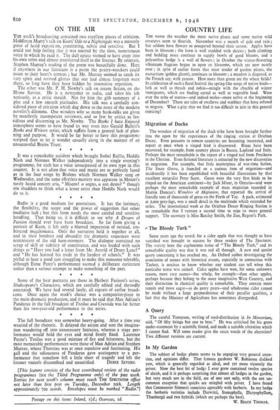ON THE AIR
Tim week's broadcasting contained two excellent pieces of criticism. Middleton Murry's talk on Keats' Ode to a Nightingale was a masterly piece of lucid exposition, penetrating, subtle and sensitive. But I could not help feeling that it was marred by the slow, monotonous voice in which he read it. The dull opiate seemed to have crept into his own veins and almost transferred itself to the listener. By contrast, Stephen Murray's reading of the poem was beautifully done. Her: if anywhere in our literature is a poem the poetry-wreckers could moan to their heart's content ; but Mr. Murray seemed to catch its very spirit and revived glories that one had almost forgotten were there, so long have they been hidden by insensitive repetition. The other was Mr. P. H. Newby's talk on recent fiction, on the Home Service. He is a newcomer to radio, and takes his job seriously, as a critic should. Not for him the glib summary of a plot and a few smooth platitudes. His talk was a carefully con- sidered piece of criticism which dug down to the roots of the modern novelist's dilemma. One wonders why so many book-talks are given by manifestly incompetent reviewers, and so few by critics as fas- tidious and discerning as Mr. Newby. The Books I have Enjoyed atmosphere seems to have found its way even into Gerald Bullett's Books and Writers series, which suffers from a general lack of plan- ning and purpose. It would be far better to have this programmt scripted than to let it wander casually along in the manner of an unsuccessful Brains Trust.
It was a remarkable accident which brought Isobel Baillie, Heddle Nash and Norman Walker independently into a single evening's programme, for each has a voice unsurpassed of its own type in this country. It is not often that voice and music are as perfectly fused as in the four songs by Brahms which Norman Walker sang on Wednesday, and the same effortless mastery was apparent in Mozart's rarely heard concert aria, " Misero! o sogno, o son desto? " though one shudders to think what a lesser artist than Heddle Nash would do to it.
Radio is a good medium for portraiture. It has the intimacy, the flexibility, the scope and the power of suggestion that other mediums lack ; but this form needs the most careful and sensitive handling. That being so, it is difficult to see why A Dream of Passion should ever have been broadcast. So far from giving a portrait of Kean, it left only a blurred impression of twisted, em- bittered megalomania. Only the narration held it together at all, and in their bombast and absurdity the dramatic sequences were reminiscent of the old barn-stormers. The dialogue contained no scrap of skill or subtlezy of contrivance, and was loaded with such things as "Have you had a letter from Mr. Arnold of Drury Lane?" and "He has learned his trade in the hardest of schools." It was pitiful to hear a good cast struggling to make this nonsense tolerable, although Esme Percy's performance seemed a deliberate caricature rather than a serious attempt to make something of the part.
* * * *
Some of the best portraits are those in Herbert Farieon's series, Shakespeare's Characters, which are carefully edited and shrewdly annotated. We have had several lately, all repeats of earlier broad- casts. Once again the week's choice was a companion-piece to the main dramatic production, and it must be said that Max Adrian's Pandarus in the full broadcast of Troilus and Cressida was far better than his two-year-old performance in the series.
* * * * The full broadcast was somewhat heavy-going. After a time one wearied of the rhetoric. It delayed the action and sent the imagina- tion wandering off into unnecessary fantasies, whereas a stage per- formance would hold the eyes and mind firmly fixed. Laurence Payne's Troilus was a good mixture of fire and bitterness, but the most memorable performances were those of Max Adrian and Stephen Murray, whose Thersites was at once repulsive and fascinating. His gall and the odiousness of Pandanis gave astringency to a per- formance that somehow fell a little short of tragedy and left the listener vaguely discomfited and unsatisfied. DEREK SEVERN.
[This feature consists of the best contributed review of the radio programmes (not the Third Programme only) of the past week. Entries for next week's column must reach THE SPECTATOR office not later than first post on Tuesday, December loth. Length approximately 700 words. Envelopes must be marked "Radio."]


































 Previous page
Previous page